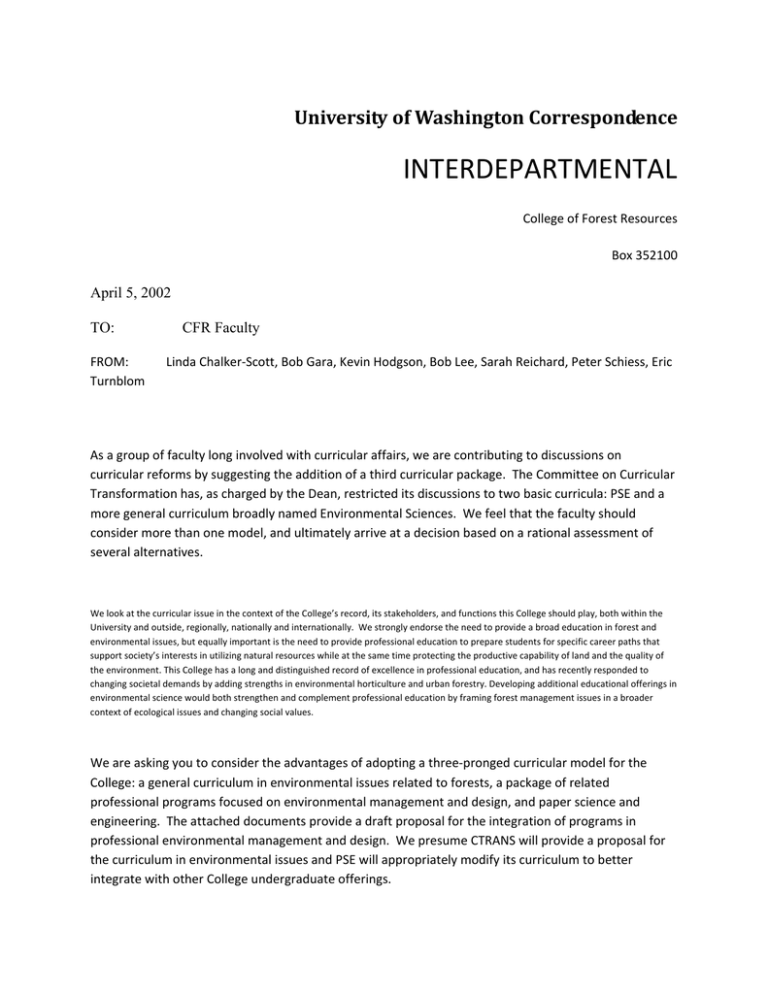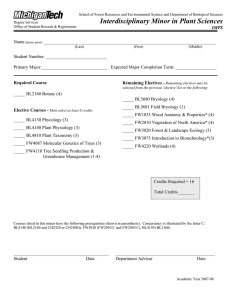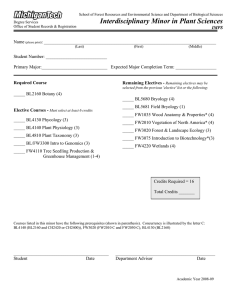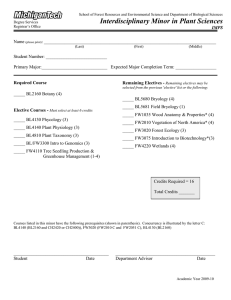INTERDEPARTMENTAL University of Washington Correspondence April 5, 2002
advertisement

University of Washington Correspondence INTERDEPARTMENTAL College of Forest Resources Box 352100 April 5, 2002 TO: CFR Faculty FROM: Linda Chalker‐Scott, Bob Gara, Kevin Hodgson, Bob Lee, Sarah Reichard, Peter Schiess, Eric Turnblom As a group of faculty long involved with curricular affairs, we are contributing to discussions on curricular reforms by suggesting the addition of a third curricular package. The Committee on Curricular Transformation has, as charged by the Dean, restricted its discussions to two basic curricula: PSE and a more general curriculum broadly named Environmental Sciences. We feel that the faculty should consider more than one model, and ultimately arrive at a decision based on a rational assessment of several alternatives. We look at the curricular issue in the context of the College’s record, its stakeholders, and functions this College should play, both within the University and outside, regionally, nationally and internationally. We strongly endorse the need to provide a broad education in forest and environmental issues, but equally important is the need to provide professional education to prepare students for specific career paths that support society’s interests in utilizing natural resources while at the same time protecting the productive capability of land and the quality of the environment. This College has a long and distinguished record of excellence in professional education, and has recently responded to changing societal demands by adding strengths in environmental horticulture and urban forestry. Developing additional educational offerings in environmental science would both strengthen and complement professional education by framing forest management issues in a broader context of ecological issues and changing social values. We are asking you to consider the advantages of adopting a three‐pronged curricular model for the College: a general curriculum in environmental issues related to forests, a package of related professional programs focused on environmental management and design, and paper science and engineering. The attached documents provide a draft proposal for the integration of programs in professional environmental management and design. We presume CTRANS will provide a proposal for the curriculum in environmental issues and PSE will appropriately modify its curriculum to better integrate with other College undergraduate offerings. Undergraduate curricula in CFR would be grouped in three packages: Environmental Science, Professional Environmental Management and Design (EMD), and Paper Science and Engineering. EMD has been designed to both integrate and up‐grade professional education in CFR. It seeks to maximize integration of professional programs while enhancing essential scientific building blocks, technical content, rigor, flexibility, and visibility (and hence students). EMD consists of two curricula: Environmental Horticulture and Urban Forestry (EHUF) and Sustainable Forest Operations (SFO). Both curricula share a common core of identical or similar courses consisting of a minimum of 80 credits in Communications, mathematics, natural sciences, VLPA/I&S University requirements, and a common professional core (20 credits). The Environmental Horticulture and Urban Forestry program (EHUF) was first developed in 1992 and was revised in 1999. Within this curriculum, there is a professional core of 40‐42 credits and three options: Environmental Horticulture, Public Horticulture, and Urban Forestry. The 41 credits of free electives have added flexibility necessary to attract students. Since its revision, this major has doubled in size (19 students in 1999, 39 students currently). The Environmental Horticulture option (~80% of our students) focuses on applying horticultural practices to the emerging fields of restoration ecology, plant conservation, and sustainable landscapes. It is the only such program in the country. SFO requires students to take a common core of a minimum of 32 credits, and provides students with a choice of three options: Sustainable Forestry, Forest Operations, and Forest and Ecological Engineering. Sustainable Forestry provides students with the opportunity to become proficient in competencies and skills essential for protecting, manipulating, and utilizing forest environments for multiple social, economic, and ecological services. Option requirements would consist of no more than 27 credits, leaving 41 credits of free electives. Requirements would be structured to meet SAF accreditation and credentialing standards. Forest Operations provides students with the competencies and skills needed to design and manage forests for the production of wood and other products while also protecting soil, water, wildlife, and other important environmental elements. Option requirements would total no more than 27 credits, leaving 41 credits for free electives. Some required courses would be taught for both Forest Operations and Forest Engineering students, with the latter required to complete more mathematical assignments and for the former conceptual assignments. Requirements would be structured to meet SAF accreditation and credentialing standards. Forest and Ecological Engineering provides students with competencies and skills needed to design and manage physical infrastructure (e.g., roads, bridges, etc.), extract forest products, and protect environmental quality. Requirement would be structured to meet ABET accreditation standards and prepare students to pass Washington State licensing examinations. Option requirements would total 25‐ 30 credits, and, with more mathematics requirements incorporated in the common professional core, would leave 27 credits of free electives. All EDM students would be required to enroll in a capstone course for a minimum of five credits. Students electing Forest Operations and Forest Engineering would be required to take 10 credits in field skills at Pack Forest in the spring quarter of their senior year along with the capstone course. The junior‐ level field skill development at Pack Forest would be incorporated in classes taught on campus, with advanced skills training in the senior year Pack experience. This requirement would involve students in multidisciplinary teams to plan and design forest operations serving multiple social, economic, and environmental objectives. Five hundred hours of technical experience in a summer job or equivalent would be required of all SFO students. We welcome your comments on this proposal. Attachments: Flow Charts List of Requirements






